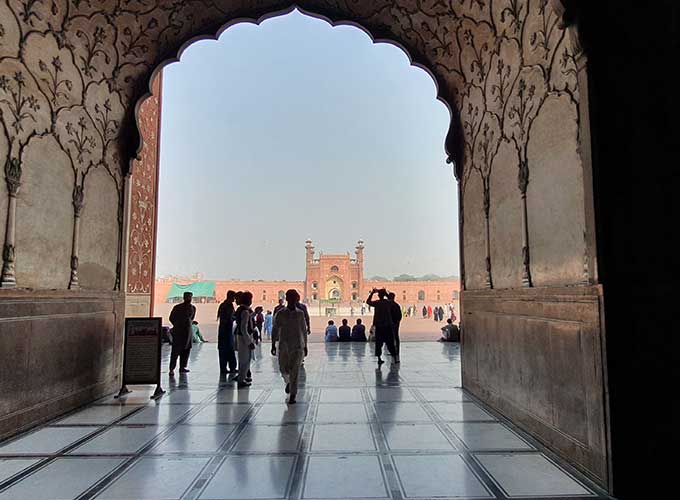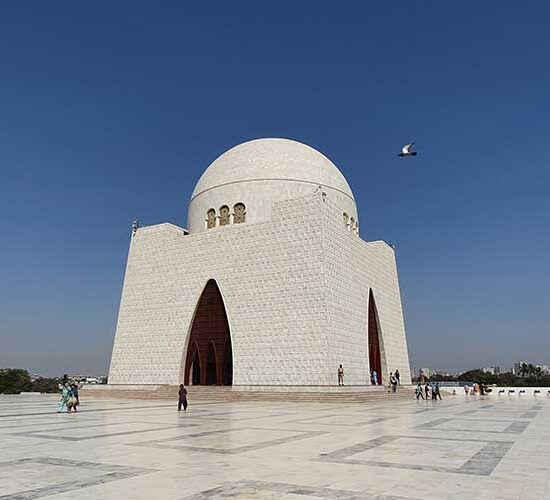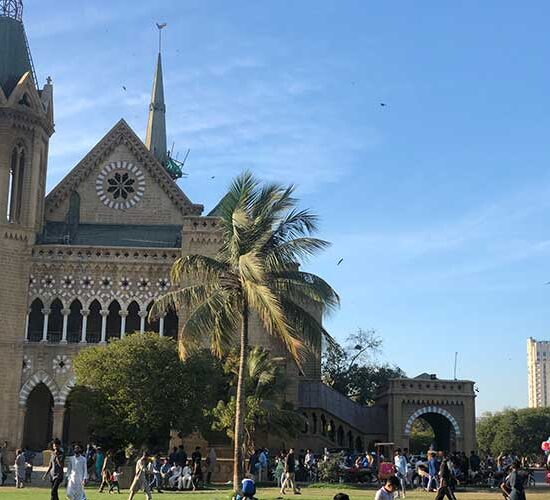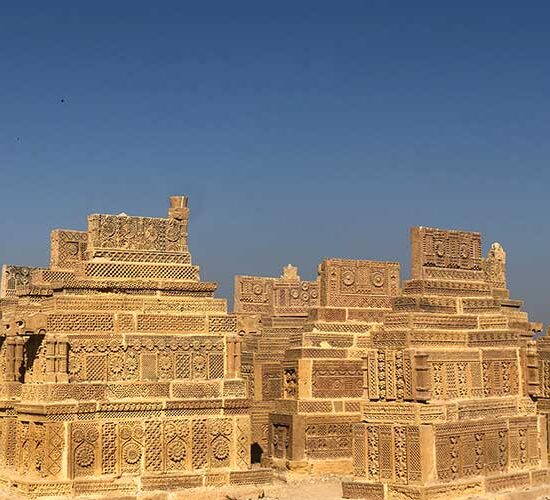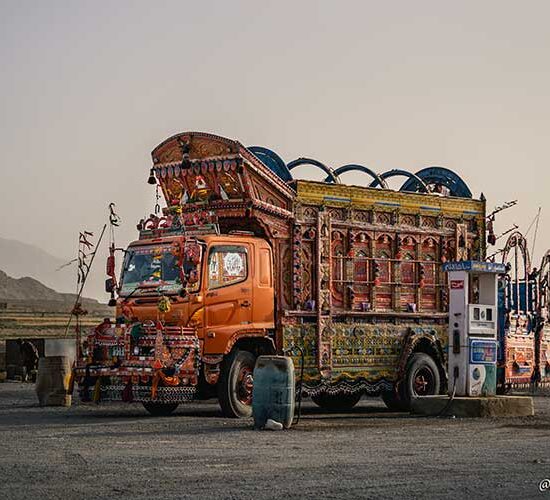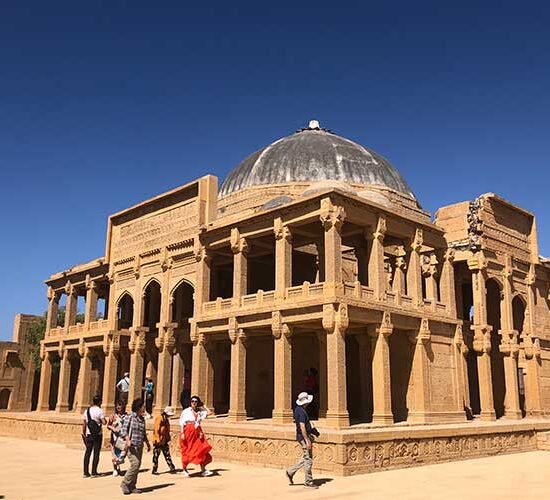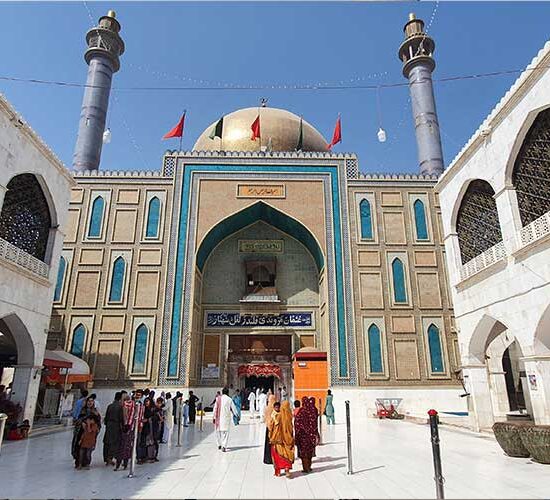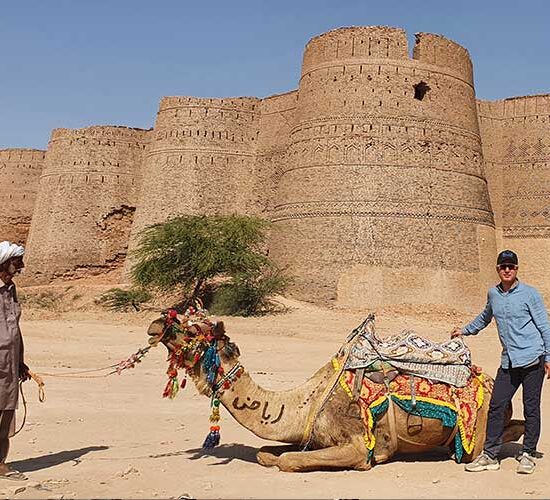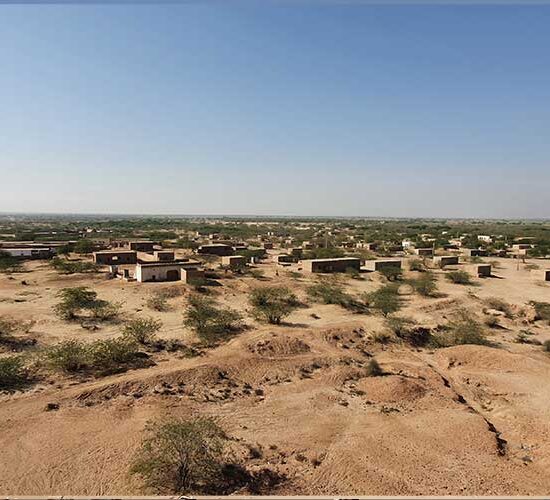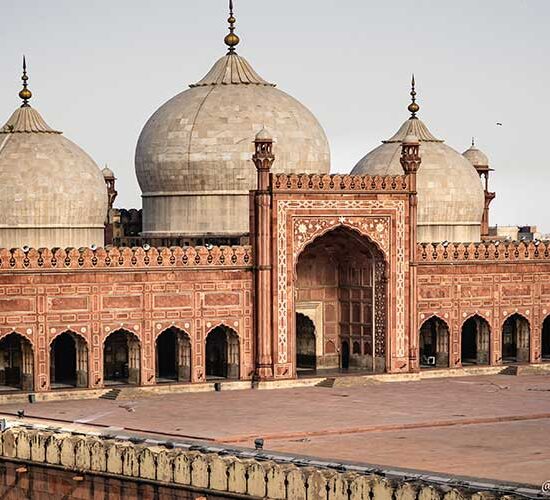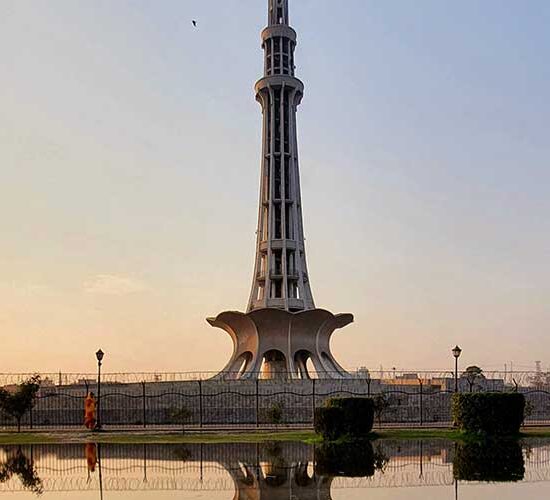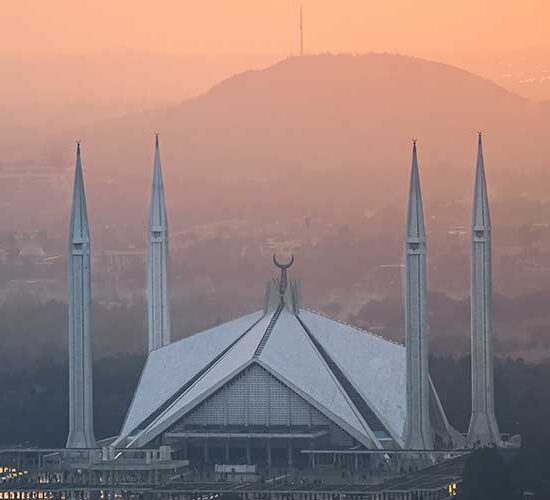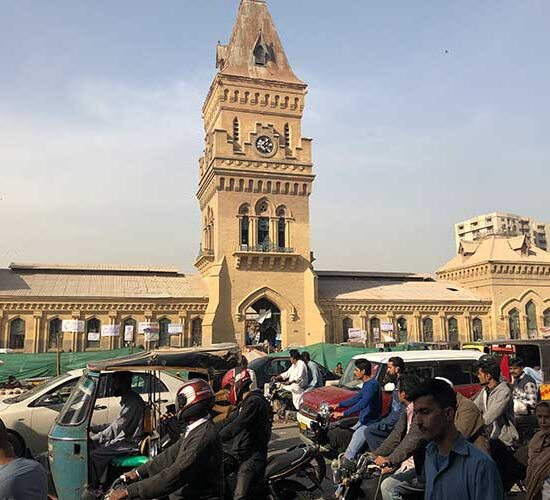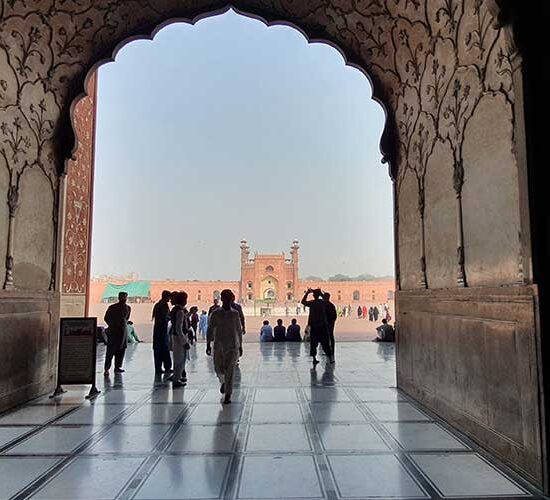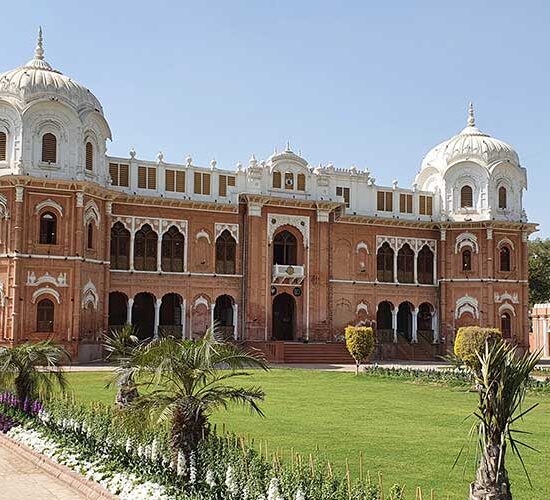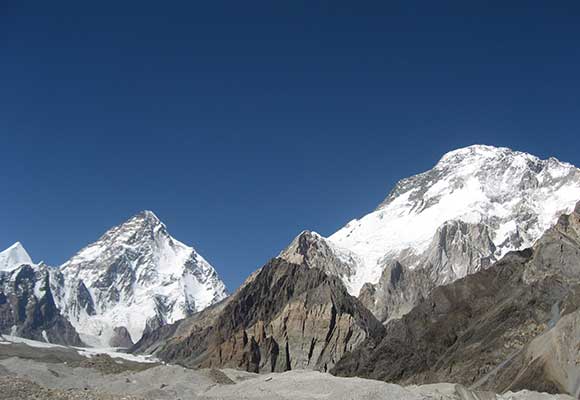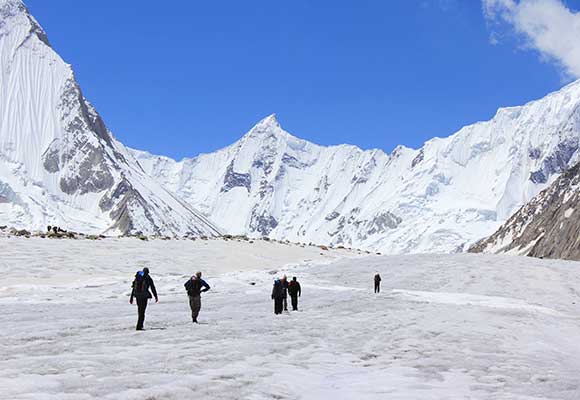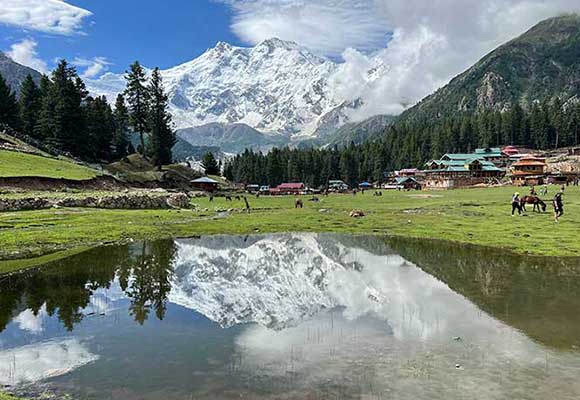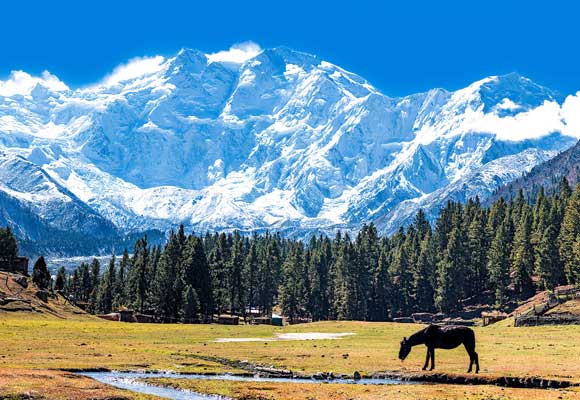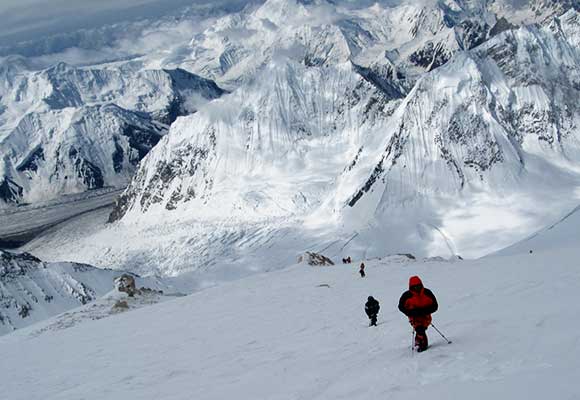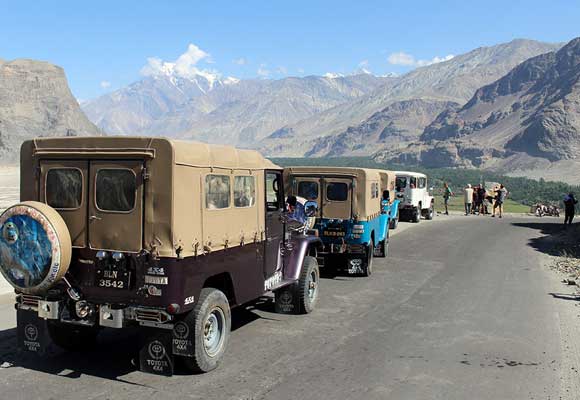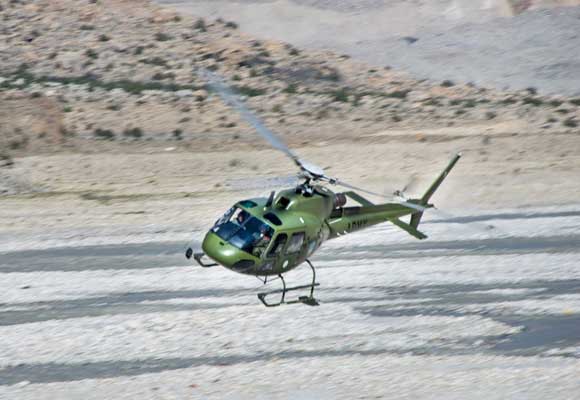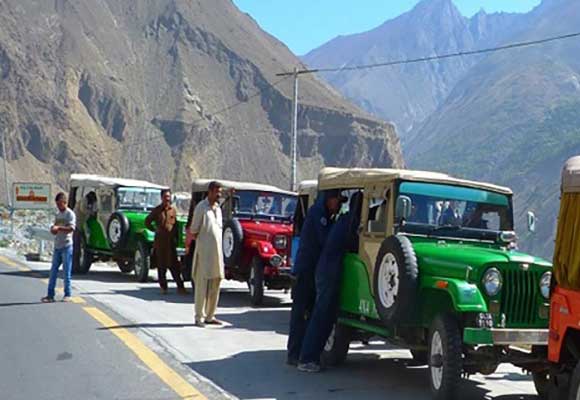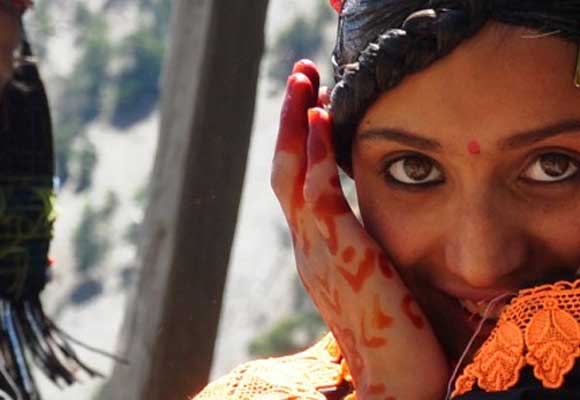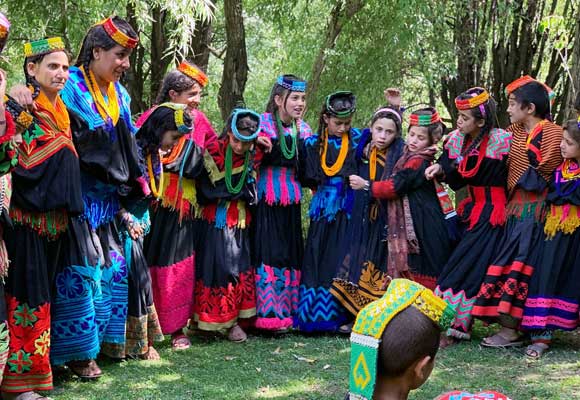Undiscovered South Pakistan
Tour Category
Group Size
Duration
From
OVERVIEW & ITINERARY
dETAILS
The tour starts from Karachi which is the capital of the Sindh province and the largest city and financial hub of the country.
Our aim is to trace a part of the Indus River all the way from near to where it flows into the Arabian sea – not far from Karachi – up to Multan. After Multan we will stop following the Indus river but we will be seeing some important side rivers when we drive up to Lahore. Extra emphasis lays on making stops at small villages along the way and having time to meet different kinds of local people and craftsmen. Besides that we think you should not miss some of the precious and most beautiful shrines in Uch Sharif and Multan and the historical places Makli, Mohenjo-Daro and Derawar Fort. These places are true gems and by visiting them you will get a better understanding of the rich history and culture of the whole area as well of the day to day life of the people that live there.
According to archaeologists, the key to the mysteries of the ancient Indus civilization lies buried in the sands of Cholistan. 400 archaeological sites have been discovered, but only few are excavated. The legendary Cholistan desert extends over 1700 square kilometres right into the Thar desert of Rajastan, India. The whole area is a desolate semi-desert expanse of sand and salt bushes. We will end the tour in Lahore which is Pakistan’s cultural and intellectual centre. The faded elegancy, busy streets, bazaars and a wide variety of Islamic and British culture make this a city of atmosphere, surprises and contrasts.
ITINERARY
Evening arrive Karachi, your Adventure Pakistan guide will be at the airport to warmly welcome you and bring you to your hotel for a good night’s rest.
We will go for a sightseeing tour of: the Mohatta palace, Defence (Tooba) mosque, Quaid-e-Azam mausoleum, Frere Hall (Bagh-e-Jinnah), Empress Market and Clifton Beach.
The Mohatta Palace was built by Shivratan Chandraratan Mohatta, an ambitious self-made businessman from Marwar as his summer home in 1927. The architect of the palace was Agha Ahmed Hussain. However, Mohatta could enjoy this building for only about two decades before independence of Pakistan and he left Karachi for India. He built the Palace in the tradition of stone palaces in Rajasthan, using pink Jodhpur stone in combination with the local yellow stone from Gizri.
Mazar-e-Quaid The mausoleum, completed in the 1960s, is situated at the heart of the city. It is the final resting place and mausoleum of Quaid-e-Azam Mohammad Ali Jinnah, founder of Pakistan.
Tooba Mosque, is often claimed to be the largest single-dome mosque in the world. It is built with pure white marble, the dome is 72 meters (236 feet) in diameter and is balanced on a low surrounding wall with no central pillars. It was built keeping acoustics in mind. A person speaking inside one end of the dome can be heard at the other end.
Frere Hall (Bagh-e-Jinnah), a beautiful British Colonial building, it now houses an art gallery (Sadequain Galerie,) a library plus a peaceful garden.
The Empress Market traces its origins to the British Raj era, when it was constructed between 1884 and 1889 and was named to commemorate Queen Victoria, Empress of India. Today, it is amongst the most popular and busy places for shopping in Karachi and reflects as one of the few historical spots of the city. Commodities sold in the Empress Market range from condiments, fruit, vegetables and meat to stationary materials, textiles and pet shops.
Clifton Beach, is Karachi's busiest beach due to its location within the central metropolitan area. Camel and horse rides on the sands are popular, while hawker stands sell cold drinks, chai (tea) and grilled corn.
We drive from Karachi to Hyderabad stopping along the way at Haleji Lake, a haven for migratory Siberian birds and crocodiles; and Makli/Thatta, an ancient town that was a river-port and the capital of Sindh, until the Indus changed its course. Here we will visit Jamia Masjid, built by Shah Jehan, who went on to build the Taj Mahal, the delicately stone-carved Dabgir Masjid, and the Makli Necropolis, claimed to be the largest graveyard in the world.
Thatta, once a capital and centre of Islamic culture is near the vast necropolis of Makli. Which gives great insight into the civilization of the Sindh from the 14th to the 18th centuries.
The enormous cemetery possessing half a million tombs and graves in an area of about 10 km2 is among the largest in the world. Kings, queens, governors, saints, scholars, and philosophers are buried here in brick or stone monuments, some of which are lavishly decorated with glazed tiles.
We drive out from Hyderabad to Ranikot Fort, also known as the Great Wall of Sindh, which is believed to be the biggest fortress in the world, and was the last stronghold of the Talpur Mirs before the British takeover. We then cross the Indus to visit Bhit Shah, the shrine of Shah Abdul Latif, Sufi saint and poet and the uncrowned king of Sindh. Especially beloved of the poor, there is a daily musical gathering at the shrine. We return to Hyderabad to explore its famous bazaar, the longest in Pakistan, and its many handicraft workshops.
Ranikot Fort is a historical Talpur fort near Sann, Jamshoro District, Sindh, it is known as The Great Wall of Sindh and is believed to be the world's largest fort with a circumference of approximately 32 kilometres. The site was nominated in 1993 by the Pakistan National Commission for UNESCO world heritage status, and has since been on the tentative list of UNESCO World Heritage Sites.
Bhitshah (59 km north of Hyderabad)
Bhitshah is famous as the last resting place of Shah Abdul Latif (1689-1752 A.D.) A great poet-saint of Sindh. Shah Abdul Latif chose this "Bhit" (sand dune or mound) as his permanent abode in 1744.
Leaving Hyderabad we drive to Sehwan, site of one of Alexander the Great’s fortresses, and the shrine of Shaikh Usman Marvandvi, popularly known as Lal Shabaz Qalandar, a 12thC Persian Sufi mystic, whose riotous annual festival is attended by thousands. Later we visit Manchar Lake, where fishermen descended from the original Indus Valley people use the same ancient fishing techniques.
Sehwan
Sehwan is an old town of pre-Islamic period. Here are the remains of Kafir-Qila, a fort reported to have been constructed by Alexander the Great. Sehwan is famous for the resting place of the great mystic poet, saint and scholar Shaikh Usman Marvandvi (1117–1274), popularly known as Shahbaz Qalandar whose mausoleum is visited by thousands of the devotees throughout the year.
Manchar Lake
Manchar is the largest fresh water lake in Asia it is as old as the Indus River and is spread over 254 square km. It is inhabited by boat men whose lifestyle – and boats – have remained unchanged since the days of the Indus Valley Civilization.
Leaving the beautiful garden city of Larkana we
drive to Mohenjo-daro, the most impressive and best-preserved ancient site on the Indian sub-Continent. An entire city belonging to the Indus Valley Civilization, contemporary with that of Ancient Egypt and Sumeria, it displays advanced town-planning techniques. Later we continue to Sukkur via Bukkur, an island in the Indus surmounted by a fort and surrounded by shrines dedicated to river-gods. Sukkur itself contains much of interest; Sateen Jo Astaan (the tombs of the seven
sisters) and Masoom Shah Jo Minaro both places give
great views of the area and have an interesting history.
Mohenjo-daro is the most ancient and best-preserved urban ruin on the Indian subcontinent, dating back to the beginning of the 3rd millennium BC. It comprises two sectors: a stupa mound that rises in the western sector and, to the east, the lower city ruins spread out along the banks of the Indus. The acropolis, set on high embankments, the ramparts, and the lower town, which is laid out according to strict rules, provide evidence of an early system of town planning.
We leave Sukkur via the Lansdowne bridge and the stupendous irrigation works completed by the British. We drive north and enter the Punjab, stopping at Uch Sharif, which contains some of the most poignant ruins in Islamic antiquity, notably the Tomb of Bibi Jewindi. We continue on to the charming city of Bahawalpur.
Uch Sharif means "The High Place". The small town is built around a hill overlooking the confluence of the rivers Sutluj and Chenab. It is famous for its exquisite Sufi Shrines which are open for public.
We drive to Derawar fort, a huge citadel towering over the surrounding Cholistan desert, where we will meet some of the desert people and learn something of their way of life. In the evening we drive to Multan
The Derawar Fort towers over the surrounding semi-desert and is visible from miles around, the marble and blue tiled tomb of the knights and their families lies a few hundred yards to the East of the Fort.
All day sight-seeing around the monuments and bazaars of Multan, the ancient capital of Lower Punjab, and renowned as the City of Sufis. The Tomb of Shah Rukn-i-Alam is a must-see, as is the shrine of Shams-ud-din Tabriz. Multan is a centre for the production of fine embroidered cottons, tilework, ceramics and traditional camel-skin lamps, and also famed for its halwa and mango chutney.
Multan is known as the City of Sufis or City of Saints because of the large number of shrines and Sufi saints from the city. It also has a number of old mosques which were once considered as the jewels of the city. Some have been dated back to over a thousand years ago and have been recognised as some of the oldest mosques within South East Asia.
Leaving in the morning we drive to the ancient site of Harappa, contemporary with Mohenjo-Daro, but also containing the remains of a later Bronze and Iron-Age city. We then continue to Lahore for our overnight stay. When driving to the hotel in Lahore we might already see some beautiful landmarks like the Minar-e-Pakistan, the Town Hall, the GPO (General Post Office) and the Governor’s House.
The site at Harappa contains the ruins of a Bronze Age fortified city, which was part of the Cemetery H culture and the Indus Valley Civilization. The city is believed to have had as many as 23,500 residents and occupied over 100 hectares at its greatest extent during the Mature Harappan phase (2600–1900 BC).
Full day sightseeing tour: the Lahore museum, the Badshahi mosque, the Lahore Fort (Shahi Qila) and at the end of the afternoon the Wagah border flag ceremony. Overnight at a hotel in Lahore.
Lahore Museum:
The Lahore Museum contains some fine specimens of Mughal and Sikh door-ways and wood-work and has a large collection of paintings dating back to the Mughal, Sikh and British periods. It includes a collection of musical instruments, ancient jewellery, textiles, pottery, and armory. There are important relics from the Indus Valley civilisation, Gandhara and Graeco-Bactrian periods as well as some Tibetan and Nepalese work on display. The Fasting Buddha from the Gandhara period is one of the most famous objects of the museum. The ceiling of the entrance hall features a large mural by renowned Pakistani artist Sadequain.
The Badshahi Mosque or the 'Royal Mosque' was commissioned by the sixth Mughal Emperor Aurangzeb in 1671 and completed in 1673. The design was inspired by Islamic, Persian, Central Asian and Indian influences and it’s the second largest mosque in Pakistan and South Asia and the fifth largest mosque in the world.
The Lahore Fort, locally referred to as Shahi Qila is the citadel of the city of Lahore. Origins of the fort go as far back as antiquity, however, the existing base structure was built during the reign of Mughal Emperor Akbar between 1556 – 1605 and was regularly upgraded by subsequent Mughal, Sikh and British rulers.
The Wagah border closing 'lowering of the flags' ceremony or The Beating Retreat ceremony is a daily military practice that the security forces of India (Border Security Force) and Pakistan (Pakistan Rangers) have jointly followed since 1959. The ceremony starts with a blustering parade by the soldiers from both the sides as well as loud sheers from proud Indian and Pakistani nationals supporting their countries and ends up in the perfectly coordinated lowering of the two nations' flags.
On our sightseeing tour today we will be making a tour of the Old Walled City including the Wazir Khan mosque and the Shahi Hammam. In the afternoon we will visit the Shalimar Gardens and the Tombs of Jahangir, Nur Jahan and Asif Khan.
Overnight at a hotel in Lahore.
Wazir Khan Mosque Complex:
The Wazir Khan Mosque is known for its extensive faience tile work, it contains some of the finest examples of Qashani tile work from the Mughal period.
Shahi Hammam:
The Shahi Hammam is the only monumental building in Pakistan which represents the Central Asian/Turkish/Irani tradition of public hot baths. It was designed as a public bathhouse to service both the visiting travellers as well as the inhabitants of the city. The Hammam is a single storey building and covers an area of approximately1,050 square metres. Built on the pattern of Turkish and Iranian bathing establishments of its time (which consisted of hot, warm and cool plunges, sweat rooms and related facilities), the Hammam is a collection of 21 inter-connected rooms offering all the facilities found in a public bath. It is the only monumental public bath in the Sub-continent from that period which still survives. The entrance gateway on the west and the main hall in the northern part of the building are exquisitely decorated with frescoed panels depicting angels, animals, birds, floral and geo-metric designs.
The Shalimar Gardens were built by the Mughal emperor Shah Jahan, construction began in 1641 AD (1051 AH) and was completed the following year. The gardens are laid out in the form of an oblong parallelogram, surrounded by a high brick wall, which is famous for its intricate fretwork.
Tomb of Jahangir:
The Tomb of Jahangir is a mausoleum built for Jahangir, who ruled the Mughal Empire from 1605 to 1627. The interior of the mausoleum is an elevated sarcophagus of white marble, the sides of which are wrought with flowers of mosaic in the same elegant style as the tombs in the Taj Mahal at Agra, India. In close proximity the tomb of his wife Nur Jahan and his brother-in-law Asif Khan can be found.
Hiran Minar is an early 16th-century Mughal era complex located in Sheikhupura, the complex was built at the site of a game reserve in honour of Mughal Emperor Jahangir's beloved antelope named Mansraj.
Sheikhupura Fort is a Mughal-era fort built in 1607 near the city of Sheikhupura, it was built during the reign of Emperor Jahangir. The fort was drastically altered during the Sikh-era, with numerous buildings constructed - some with exquisite Sikh-era frescoes. In 1808, the fort was conquered by the six-year-old of Maharaja Ranjit Singh, Prince Kharak Singh. In mid 19th century when power turned to the British, the fort of Sheikhupura was used for the 'house arrest' of Maharaja’s last queen, Maharani Jind Kaur the mother of Maharaja Duleep Singh.
Anarkali Bazaar:
Anarkali Bazaar is one of the oldest surviving markets in South Asia, dating back at least 200 years. The market derives its name from a nearby mausoleum thought to be that of a slave girl named Anārkalī, buried alive by order of the Mughal Emperor Akbar for having a love affair with his son, Prince Salīm, who would later become Emperor Jahāngīr. The Bazaar is divided into two portions, the Old Anarkali Bazaar is known for traditional food items while the New Anarakli Bazaar is noted for its traditional handicraft and embroidery cloths.
From the cultural “capital” Lahore we will drive west to the capital of Pakistan, the city of Islamabad, half way we make a stop to visit the Katasraj Temple and explore the Khewra Salt Mines. Dinner & overnight at hotel in Islamabad Katasraj Mandir is a Hindu mandir or temple complex situated in Katas village near Choa Saidanshah dedicated to Shiva. The smaller temples, built in pairs around the larger central temple, were built around 900 years or so ago, although the earliest of them dates back to the latter half of the 6th century AD. The Katas site houses the Satgraha, a group of seven ancient temples, remains of a Buddhist stupa, a few medieval temples, havelis and some recently constructed temples, scattered around a pond considered holy by Hindus. The Khewra Salt Mine (or Mayo Salt Mine) is located in Khewra, is Pakistan's largest and oldest salt mine and the world's second largest. Its history dates back to its discovery by Alexander's troops in 320 BC, but it started trading in the Mughal era.
Your last day in Pakistan! We will have a sightseeing tour in Islamabad which will consist of a selection of some of the following sites: the Faisal Mosque, the Government buildings on Constitution Avenue, the Shakar Parian Park with its rose and jasmine garden, the Pakistan Monument, the Lok Virsa heritage museum, Saidpur village, Rawal Lake, Daman-e-Koh viewpoint. Our goodbye dinner will be at Monal restaurant on the top of the Margalla Hills.
- 5,000-year-old Indus Valley archaeological sites, comparable to Egypt
- Massive mud-brick forts and domed, tiled tombs set in the desert
- Pakistan’s painted buses, bustling bazaars, and famed blue pottery
- Convergence of Muslim, Hindu, Sufi, Sikh, and other religions
- Interactions with Pakistani curators, scholars, and artisans
- You will discover the tombs of some of the country’s most revered mystics and poets, visit the World Heritage ruins of Mohenjo-daro and travel into the deserts of Cholistan to see the imposing fortress of Derawar
DATES & PRICES
Start Date |
End Date |
Price |
Deposit |
Status |
|
|---|---|---|---|---|---|
15 October 2023 |
30 October 2023 |
USD $2200 |
USD $300 |
Available |
|
04 November 2023 |
19 November 2023 |
USD $2200 |
USD $300 |
Available |
|
28 November 2023 |
13 December 2023 |
USD $2200 |
USD $300 |
Available |
|
15 January 2024 |
30 January 2024 |
USD $2200 |
USD $300 |
Available |
|
03 February 2024 |
18 February 2024 |
USD $2200 |
USD $300 |
Available |
|
24 February 2024 |
10 March 2024 |
USD $2200 |
USD $300 |
Available |
WHAT'S INCLUDED
- Visa invitation letter & supporting documents.
- Assistance on arrival / departure – incl. airport transfers
- Domestic airfare Islamabad – Gilgit- Islamabad
- Hotel accommodation based on twin room sharing including breakfast & taxes
- Accommodation in huts at fairy meadows
- All meals, lunch & dinners mineral water incl. – other drinks not included
- Highly experienced English speaking guides from arrival till departure
- Air-conditioned private transport incl. driver(s), fuel, toll taxes and parking fees as per the itinerary,
- 4x4 jeeps from Raikot bride to Tatto village & return
- 2 mineral water bottles per person per day
- Tourist site / Museum / National Park entrance fees included as per the itinerary
WHAT'S NOT INCLUDED
- International airfare
- Airport tax
- Excess baggage charges
- if any Extras such as room service, private phone / inter
ROUTE MAP
Find a route from your location
gallery
Frequently asked questions
Is it safe to travel in Pakistan?
It is a fair question to ask as we know that most of the news from Pakistan is not so positive, but the image which people have abroad is far from the reality. Although there have been valid reasons for people to consider Pakistan as not very safe, a lot has changed in recent years. The security situation has improved dramatically and the government has been making efforts to promote tourism and facilitate travel. When you visit you will notice immiediately that Pakistanis are very hospitable people, they are eager to get to know you and often will invite you in their home. Pakistan is a huge country, we only offer tours and treks to areas which we deem safe. We currently don’t recommend to travel to the border region with Afghanistan and certain parts of Balochistan but most other places can be visited without any problem. If you prefer to start with the safest region then we would recommend Gilgit-Baltistan in the north, the people here largely depend on tourism for their income and have been warmly welcoming foreign tourist for many years.
Do you offer customized tours / treks?
Yes, all the tours and treks that we offer on our website can be completely customized to your own requirements. We are also happy to design a tailor-made tour for you from scratch. Just let us know your preferences, special interests, number of days you have available etc. and we will send you our personalized itinerary suggestions.
How long in advance do I need to apply for my visa?
If you have to apply for a standard tourist visa then 1 month in advance should be sufficient – in most cases you will receive your visa within a few days / a week – you should not apply more than 3 months in advance. If you have to apply for a trekking visa then you will need to be prepared for a longer processing time, we recommend to apply 3 to 2 months in advance.
What kind of travel insurance do I need?
This will depend on the type of tour that you are planning. Please make sure to consult your travel insurance before your trip to make sure you have proper coverage for your tour and the activities you will undertake. Especially when you go on a trek it is important to have mountain emergency search and rescue / repatriation by helicopter included in your insurance package.
I'm a woman, should I wear a headscarf when I'm in Pakistan?
It is not needed to wear a headscarf, of course you may do so if you feel more comfortable. It will be good however to bring a scarf which you can wear when visiting a mosque or other religious site and or when going to a more conservative area.
Is there a recommended dress code?
Pakistan is an Islamic country and it is therefore advisable for women not to wear short skirts / tops or short trousers in public. A headscarf will come in handy for women when they visit a mosque / religious site or sometimes it can be a custom in more remote / conservative areas. Dress codes for men are more lenient, though shorts are uncommon – they can be worn depending on the places you visit on a certain day (for example if you visit a mosque, sacred site or very conservative area it might be better to adjust your clothes to a more modest style – feel free to ask your guide if you are not sure). If you are going on a trek you can wear shorts without any problems.
Can I visit Pakistan in winter?
Yes, you defintely can. The south of Pakistan is actually the best to be visited in the winter as it will be way too hot in the summer. Also the north has great options, you can go skiing or make a nice winter hike. Some passes in the north will be closed due to snow which means we will have to adjust certain itineraries but there are enough places which you can visit. Please don’t hesitate to inquire about the possibilities.
Do I need a visa for this trip?
For all trips to Pakistan you will require a visa, depending on the the type of tour you will either need a standard tourist visa or a trekking visa. Our sales team will provide you with all the necessary information as well as a visa invitation letter and related supporting documents after you have booked your tour with us.
How much price about tour & travels
Lorem ipsum dolor sit amet, utinam munere antiopam vel ad. Qui eros iusto te. Nec ad feugiat honestatis. Quo illum detraxit an. Ius eius quodsi molestiae at, nostrum definitiones his cu. Discere referrentur mea id, an pri novum possim deterruisset. Eum oratio reprehendunt cu. Nec te quem assum postea.
Who will meet me on arrival?
An Adventure Pakistan representative will meet you at the airport and will bring you to your hotel.
Where do I fly to for this trip?
You will fly roundtrip to Islamabad, Pakistan.
Do I need to bring my own sleeping bag and pad for this trip?
Yes. You will need to bring your own sleeping bag, for the K2 treks and Snow Lake trek during the main summer season we recommend it to be suitable for temperatures up to minus 10 degrees Celsius / 15 Fahrenheit. It is also advisable to bring your own sleeping pad for comfort, please kindly keep in mind that on many days you will be sleeping on rock / snow / ice. For other treks we are happy to advise you on the type of sleeping bag depending on the season and location.
Will I have Wi-Fi on the trip?
Yes. You will have Wi-Fi in your hotel in Islamabad and Skardu, during the K2 trek there will be limited connectivity at Concordia. If you like we can also arrange a local SIM card for you with a mobile data package so that you can stay in touch more easily with your loved ones.
Why does Adventure Pakistan cost more than other companies?
We know that you will be able to find cheaper tour options but there are big differences in some of the services being offered. Most important to us is that all our clients have a safe and the greatest trip ever but also that our staff and supporting partners are paid fairly for all their hard work and big efforts. We do not compromise on safety, this means that we only work with experienced guides / supporting staff and drivers and that all vehicles and materials which we use during our treks and tours are of high quality and kept well maintained. You will always sleep in clean & safe accommodations / have proper camping gear and we inform you in advance at which hotels or guesthouses you will be staying so that you won’t have any suprises afterwards. We pay great attention to detail while preparing your trip so that you get the best possible & most enjoyable experience taking into account any special requirements you may have or assistance you would need, you can share your specific interests, fitness and experience level, dietary requirements etc. and we take care of the rest. Our staff is our key assest, we take great pride in having an incredible team of very experienced, very kind and caring guides and other supporting staff who will provide you with the best memories. Something we are known for during our treks is the excellent food which is being prepared by our cooking team, we don’t skimp on this as we know that good, tasty and varied food is vital during a trek. You will be looking forward to your meals each day this is something we can guarantee! One of the last things we would like to highlight is our network – we have a very extensive network all over Pakistan this means that if there is any problem during your trip we are able to respond adequatly, without any delay. Besides having a good network we also have many years of experience – we know what to do and whom to contact, our team carries out emergency and rescue operations for international insurance companies each year so you can rest assured that you will be in good hands.
Is it safe to travel in Pakistan?
It is a fair question to ask as we know that most of the news from Pakistan is not so positive, but the image which people have abroad is far from the reality. Although there have been valid reasons for people to consider Pakistan as not very safe, a lot has changed in recent years. The security situation has improved dramatically and the government has been making efforts to promote tourism and facilitate travel. When you visit you will notice immiediately that Pakistanis are very hospitable people, they are eager to get to know you and often will invite you in their home. Pakistan is a huge country, we only offer tours and treks to areas which we deem safe. We currently don’t recommend to travel to the border region with Afghanistan and certain parts of Balochistan but most other places can be visited without any problem. If you prefer to start with the safest region then we would recommend Gilgit-Baltistan in the north, the people here largely depend on tourism for their income and have been warmly welcoming foreign tourist for many years.
Do you offer customized tours / treks?
Yes, all the tours and treks that we offer on our website can be completely customized to your own requirements. We are also happy to design a tailor-made tour for you from scratch. Just let us know your preferences, special interests, number of days you have available etc. and we will send you our personalized itinerary suggestions.
How long in advance do I need to apply for my visa?
If you have to apply for a standard tourist visa then 1 month in advance should be sufficient – in most cases you will receive your visa within a few days / a week – you should not apply more than 3 months in advance. If you have to apply for a trekking visa then you will need to be prepared for a longer processing time, we recommend to apply 3 to 2 months in advance.
What kind of travel insurance do I need?
This will depend on the type of tour that you are planning. Please make sure to consult your travel insurance before your trip to make sure you have proper coverage for your tour and the activities you will undertake. Especially when you go on a trek it is important to have mountain emergency search and rescue / repatriation by helicopter included in your insurance package.
I'm a woman, should I wear a headscarf when I'm in Pakistan?
It is not needed to wear a headscarf, of course you may do so if you feel more comfortable. It will be good however to bring a scarf which you can wear when visiting a mosque or other religious site and or when going to a more conservative area.
Is there a recommended dress code?
Pakistan is an Islamic country and it is therefore advisable for women not to wear short skirts / tops or short trousers in public. A headscarf will come in handy for women when they visit a mosque / religious site or sometimes it can be a custom in more remote / conservative areas. Dress codes for men are more lenient, though shorts are uncommon – they can be worn depending on the places you visit on a certain day (for example if you visit a mosque, sacred site or very conservative area it might be better to adjust your clothes to a more modest style – feel free to ask your guide if you are not sure). If you are going on a trek you can wear shorts without any problems.
Can I visit Pakistan in winter?
Yes, you defintely can. The south of Pakistan is actually the best to be visited in the winter as it will be way too hot in the summer. Also the north has great options, you can go skiing or make a nice winter hike. Some passes in the north will be closed due to snow which means we will have to adjust certain itineraries but there are enough places which you can visit. Please don’t hesitate to inquire about the possibilities.
Do I need a visa for this trip?
For all trips to Pakistan you will require a visa, depending on the the type of tour you will either need a standard tourist visa or a trekking visa. Our sales team will provide you with all the necessary information as well as a visa invitation letter and related supporting documents after you have booked your tour with us.
How much price about tour & travels
Lorem ipsum dolor sit amet, utinam munere antiopam vel ad. Qui eros iusto te. Nec ad feugiat honestatis. Quo illum detraxit an. Ius eius quodsi molestiae at, nostrum definitiones his cu. Discere referrentur mea id, an pri novum possim deterruisset. Eum oratio reprehendunt cu. Nec te quem assum postea.
Who will meet me on arrival?
An Adventure Pakistan representative will meet you at the airport and will bring you to your hotel.
Where do I fly to for this trip?
You will fly roundtrip to Islamabad, Pakistan.
Do I need to bring my own sleeping bag and pad for this trip?
Yes. You will need to bring your own sleeping bag, for the K2 treks and Snow Lake trek during the main summer season we recommend it to be suitable for temperatures up to minus 10 degrees Celsius / 15 Fahrenheit. It is also advisable to bring your own sleeping pad for comfort, please kindly keep in mind that on many days you will be sleeping on rock / snow / ice. For other treks we are happy to advise you on the type of sleeping bag depending on the season and location.
Will I have Wi-Fi on the trip?
Yes. You will have Wi-Fi in your hotel in Islamabad and Skardu, during the K2 trek there will be limited connectivity at Concordia. If you like we can also arrange a local SIM card for you with a mobile data package so that you can stay in touch more easily with your loved ones.
Why does Adventure Pakistan cost more than other companies?
We know that you will be able to find cheaper tour options but there are big differences in some of the services being offered. Most important to us is that all our clients have a safe and the greatest trip ever but also that our staff and supporting partners are paid fairly for all their hard work and big efforts. We do not compromise on safety, this means that we only work with experienced guides / supporting staff and drivers and that all vehicles and materials which we use during our treks and tours are of high quality and kept well maintained. You will always sleep in clean & safe accommodations / have proper camping gear and we inform you in advance at which hotels or guesthouses you will be staying so that you won’t have any suprises afterwards. We pay great attention to detail while preparing your trip so that you get the best possible & most enjoyable experience taking into account any special requirements you may have or assistance you would need, you can share your specific interests, fitness and experience level, dietary requirements etc. and we take care of the rest. Our staff is our key assest, we take great pride in having an incredible team of very experienced, very kind and caring guides and other supporting staff who will provide you with the best memories. Something we are known for during our treks is the excellent food which is being prepared by our cooking team, we don’t skimp on this as we know that good, tasty and varied food is vital during a trek. You will be looking forward to your meals each day this is something we can guarantee! One of the last things we would like to highlight is our network – we have a very extensive network all over Pakistan this means that if there is any problem during your trip we are able to respond adequatly, without any delay. Besides having a good network we also have many years of experience – we know what to do and whom to contact, our team carries out emergency and rescue operations for international insurance companies each year so you can rest assured that you will be in good hands.
REPORTS & REVIEWS
Region
Period
Level
Comfort
Frequently asked questions
Is it safe to travel in Pakistan?
It is a fair question to ask as we know that most of the news from Pakistan is not so positive, but the image which people have abroad is far from the reality. Although there have been valid reasons for people to consider Pakistan as not very safe, a lot has changed in recent years. The security situation has improved dramatically and the government has been making efforts to promote tourism and facilitate travel. When you visit you will notice immiediately that Pakistanis are very hospitable people, they are eager to get to know you and often will invite you in their home. Pakistan is a huge country, we only offer tours and treks to areas which we deem safe. We currently don’t recommend to travel to the border region with Afghanistan and certain parts of Balochistan but most other places can be visited without any problem. If you prefer to start with the safest region then we would recommend Gilgit-Baltistan in the north, the people here largely depend on tourism for their income and have been warmly welcoming foreign tourist for many years.
Do you offer customized tours / treks?
Yes, all the tours and treks that we offer on our website can be completely customized to your own requirements. We are also happy to design a tailor-made tour for you from scratch. Just let us know your preferences, special interests, number of days you have available etc. and we will send you our personalized itinerary suggestions.
How long in advance do I need to apply for my visa?
If you have to apply for a standard tourist visa then 1 month in advance should be sufficient – in most cases you will receive your visa within a few days / a week – you should not apply more than 3 months in advance. If you have to apply for a trekking visa then you will need to be prepared for a longer processing time, we recommend to apply 3 to 2 months in advance.
What kind of travel insurance do I need?
This will depend on the type of tour that you are planning. Please make sure to consult your travel insurance before your trip to make sure you have proper coverage for your tour and the activities you will undertake. Especially when you go on a trek it is important to have mountain emergency search and rescue / repatriation by helicopter included in your insurance package.
I'm a woman, should I wear a headscarf when I'm in Pakistan?
It is not needed to wear a headscarf, of course you may do so if you feel more comfortable. It will be good however to bring a scarf which you can wear when visiting a mosque or other religious site and or when going to a more conservative area.
Is there a recommended dress code?
Pakistan is an Islamic country and it is therefore advisable for women not to wear short skirts / tops or short trousers in public. A headscarf will come in handy for women when they visit a mosque / religious site or sometimes it can be a custom in more remote / conservative areas. Dress codes for men are more lenient, though shorts are uncommon – they can be worn depending on the places you visit on a certain day (for example if you visit a mosque, sacred site or very conservative area it might be better to adjust your clothes to a more modest style – feel free to ask your guide if you are not sure). If you are going on a trek you can wear shorts without any problems.
Can I visit Pakistan in winter?
Yes, you defintely can. The south of Pakistan is actually the best to be visited in the winter as it will be way too hot in the summer. Also the north has great options, you can go skiing or make a nice winter hike. Some passes in the north will be closed due to snow which means we will have to adjust certain itineraries but there are enough places which you can visit. Please don’t hesitate to inquire about the possibilities.
Do I need a visa for this trip?
For all trips to Pakistan you will require a visa, depending on the the type of tour you will either need a standard tourist visa or a trekking visa. Our sales team will provide you with all the necessary information as well as a visa invitation letter and related supporting documents after you have booked your tour with us.
How much price about tour & travels
Lorem ipsum dolor sit amet, utinam munere antiopam vel ad. Qui eros iusto te. Nec ad feugiat honestatis. Quo illum detraxit an. Ius eius quodsi molestiae at, nostrum definitiones his cu. Discere referrentur mea id, an pri novum possim deterruisset. Eum oratio reprehendunt cu. Nec te quem assum postea.
Who will meet me on arrival?
An Adventure Pakistan representative will meet you at the airport and will bring you to your hotel.
Where do I fly to for this trip?
You will fly roundtrip to Islamabad, Pakistan.
Do I need to bring my own sleeping bag and pad for this trip?
Yes. You will need to bring your own sleeping bag, for the K2 treks and Snow Lake trek during the main summer season we recommend it to be suitable for temperatures up to minus 10 degrees Celsius / 15 Fahrenheit. It is also advisable to bring your own sleeping pad for comfort, please kindly keep in mind that on many days you will be sleeping on rock / snow / ice. For other treks we are happy to advise you on the type of sleeping bag depending on the season and location.
Will I have Wi-Fi on the trip?
Yes. You will have Wi-Fi in your hotel in Islamabad and Skardu, during the K2 trek there will be limited connectivity at Concordia. If you like we can also arrange a local SIM card for you with a mobile data package so that you can stay in touch more easily with your loved ones.
Why does Adventure Pakistan cost more than other companies?
We know that you will be able to find cheaper tour options but there are big differences in some of the services being offered. Most important to us is that all our clients have a safe and the greatest trip ever but also that our staff and supporting partners are paid fairly for all their hard work and big efforts. We do not compromise on safety, this means that we only work with experienced guides / supporting staff and drivers and that all vehicles and materials which we use during our treks and tours are of high quality and kept well maintained. You will always sleep in clean & safe accommodations / have proper camping gear and we inform you in advance at which hotels or guesthouses you will be staying so that you won’t have any suprises afterwards. We pay great attention to detail while preparing your trip so that you get the best possible & most enjoyable experience taking into account any special requirements you may have or assistance you would need, you can share your specific interests, fitness and experience level, dietary requirements etc. and we take care of the rest. Our staff is our key assest, we take great pride in having an incredible team of very experienced, very kind and caring guides and other supporting staff who will provide you with the best memories. Something we are known for during our treks is the excellent food which is being prepared by our cooking team, we don’t skimp on this as we know that good, tasty and varied food is vital during a trek. You will be looking forward to your meals each day this is something we can guarantee! One of the last things we would like to highlight is our network – we have a very extensive network all over Pakistan this means that if there is any problem during your trip we are able to respond adequatly, without any delay. Besides having a good network we also have many years of experience – we know what to do and whom to contact, our team carries out emergency and rescue operations for international insurance companies each year so you can rest assured that you will be in good hands.
SIMILAR Tours
- Quality4.75
- Location4.75
- Amenities4.25
- Services5
- Price4.25
- Quality4.75
- Location4.75
- Amenities4.25
- Services5
- Price4.25
- Quality4.75
- Location4.75
- Amenities4.25
- Services5
- Price4.25
- Quality4.67
- Location4.67
- Amenities4
- Services5
- Price4
- Quality4.67
- Location4.67
- Amenities4
- Services5
- Price4
- Quality4.67
- Location4.67
- Amenities4
- Services5
- Price4
- Quality4.67
- Location4.67
- Amenities4
- Services5
- Price4
- Quality4.67
- Location4.67
- Amenities4
- Services5
- Price4
- Quality4.67
- Location4.67
- Amenities4
- Services5
- Price4
- Quality4.67
- Location4.67
- Amenities4
- Services5
- Price4
- Quality4.67
- Location4.67
- Amenities4
- Services5
- Price4
- Quality4.67
- Location4.67
- Amenities4
- Services5
- Price4













